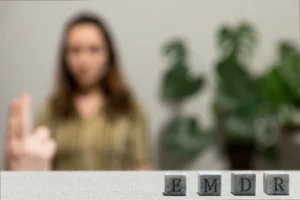Bipolar disorder is a mental health condition characterized by extreme mood swings, oscillating between manic highs and depressive lows, that can be further complicated by substance use.
Yet, the intertwining of bipolar disorder and stimulant addiction reveals a complex web of interactions.
While many substances can affect one’s mental well-being, stimulants pose a particular risk for those with bipolar disorder, hinting at a dangerous interaction between the two.
Understanding Bipolar Disoder
Bipolar disorder, known as manic-depressive illness, is a mental health disorder characterized by recurring mood fluctuations.
Individuals with this disorder experience phases of mania, where they feel euphoric, overly energetic, or unusually irritable, followed by periods of depression characterized by feelings of sadness, hopelessness, and a lack of energy.
To manage these intense mood swings, common treatments often include a combination of medications, such as mood stabilizers, antipsychotics, and psychotherapy.
Lifestyle adjustments, regular therapy sessions, and support groups also play a crucial role in helping individuals cope and lead fulfilling lives.
What are Stimulants
| Stimulant | Description |
|---|---|
| Caffeine | Found in coffee, tea, and many sodas, caffeine is a mild stimulant that many people consume daily. It can enhance alertness and combat fatigue. |
| Nicotine | The active substance in tobacco products, nicotine stimulates the release of neurotransmitters that can elevate mood and increase heart rate. |
| Amphetamines | Often prescribed for conditions like ADHD. They can increase focus and attention in users. Street drugs like “speed” or “meth” are illicit forms of amphetamines and are more potent and risky. |
| Cocaine | A powerful illegal drug that provides an intense euphoric sensation. It blocks the reuptake of certain neurotransmitters in the brain, leading to increased feelings of pleasure and alertness. |
How Bipolar and Stimulant Use Affects People
Stimulants have some direct impacts on the brains of those with bipolar, which uniquely affects them.
| Impact | Bipolar Symptoms |
|---|---|
| Triggering Manic Episodes | Stimulants may trigger or exacerbate manic episodes, with high energy, impulsivity, and less need for sleep. |
| Exacerbating Existing Mania | In those already experiencing mania, stimulants can heighten euphoria and recklessness, sometimes leading to psychosis. |
| Deepening Depressive Phases | The comedown from stimulants can deepen depressive states, enhancing sadness, fatigue, and hopelessness. |
| Rapid Cycling of Moods | Stimulants can cause rapid mood swings, oscillating between mania and depression rapidly, complicating symptom management. |
Neurological Interactions
Impact on Neurotransmitters:
Individuals with bipolar disorder often have imbalances in neurotransmitters such as serotonin, dopamine, and norepinephrine. These chemicals play vital roles in regulating mood, energy, and motivation.
Stimulants typically increase the release of or decrease the removal of these neurotransmitters from synapses (the gaps between nerve cells).
In those with bipolar disorder, this can lead to overstimulation, further destabilizing mood and potentially triggering or exacerbating manic or depressive episodes.
Interference with Medications:
Many individuals with bipolar disorder are prescribed medications like mood stabilizers like lithium or antipsychotics to manage their symptoms.
Stimulants can interfere with the effectiveness of these medications.
For instance, they might reduce the therapeutic levels of these drugs in the bloodstream, rendering them less effective.
Mixing stimulants with these medications can increase the risk of side effects or negative symptoms, as both act on similar neurotransmitter pathways but often in conflicting manners.
The decision to use stimulants, either medically prescribed or recreationally, should be approached with caution by individuals with bipolar disorder!
The potential for neurological interference and unwanted drug interactions is high, posing significant risks to mental stability and overall health.
The Risk of Dependency and Dual Diagnosis
| Risk | Symptoms |
|---|---|
| Self-medication | Individuals may use stimulants to manage depressive episodes or to prolong manic highs. |
| Impulsivity | Manic episodes can lead to increased drug use due to impulsive behavior and poor judgment. |
| Brain Chemistry | Neurotransmitter imbalances may increase susceptibility to stimulant effects and addiction. |
| Complication | Symptoms |
|---|---|
| Symptom Overlap | The effects of stimulants can mimic both manic and depressive episodes, complicating diagnosis. |
| Treatment Interference | Stimulant abuse may reduce the effectiveness of bipolar medications, hindering symptom control. |
Personal Stories and Anecdotal Evidence
Ethan’s Journey: A Path of Resilience
Meet Ethan, and He’s a journalist.
Ethan faced the most significant challenge of his life shortly after his 23rd birthday when he was officially diagnosed with bipolar disorder.
As a college student grappling with the pressures of school and his mental health.
Ethan discovered an illicit form of escape in cocaine.
Initially, it was just a social indulgence, a good “pick me up” during the depressive lows of bipolar disorder.
But the temporary highs it offered became a crutch.
In a search for something more substantial during one of his cocaine-fueled highs, Ethan was introduced to methamphetamine.
The decision to try meth, driven by impulsivity and the craving for relief, plunged Ethan into a harrowing addiction that amplified his bipolar symptoms exponentially.
His manic episodes, once sporadic, became frequent and intense, lasting days or weeks.
His life became reckless with impulsive decisions and actions, and then, inevitably, he crashed into deep depressive states.
After two unsuccessful stints in rehab, Ethan’s friends and family, exhausted from the constant turmoil, presented him with an ultimatum: commit to recovery or face being cut off.
It was a moment of stark clarity.
Faced with the potential loss of everything and everyone he held dear, Ethan chose recovery.
In rehab, Ethan committed to the program.
He worked closely with addiction specialists and psychiatrists, grappling with the dual challenges of his substance abuse and bipolar disorder.
As he progressed, he developed a routine that included daily exercise, medication for his bipolar disorder, and regular therapy sessions.
These tools became his foundation, helping him maintain the delicate balance of his mental health and keeping the manic and depressive episodes at bay.
Ethan emerged from rehab with a renewed sense of purpose.
He resumed his dream of becoming a journalist, using his experiences to fuel his writing and to advocate for mental health awareness.
The tools and strategies he learned in recovery became his compass, guiding him through the highs and lows of life.
Ethan’s story is one of resilience and hope.
It’s a testament to the power of comprehensive care, the importance of a strong support network, and the indomitable human spirit’s ability to overcome even the most daunting challenges.
Professional Recommendations
Healthcare professionals universally caution against the use of stimulants by individuals with bipolar disorder.
Professionals emphasize that the temporary relief or euphoria provided by stimulants is outweighed by the potential risks, including triggering manic episodes, worsening depression, and complicating treatment plans.
Instead of turning to stimulants, professionals advocate for safer alternatives and coping strategies.
Medication Adherence:
Sticking to prescribed mood stabilizers or antipsychotic medications is crucial.
These drugs help manage the symptoms of bipolar disorder, reducing the perceived need for self-medication with stimulants.
Psychotherapy:
Cognitive Behavioral Therapy (CBT) can equip individuals with tools to manage their symptoms, resist impulses, and develop healthier coping mechanisms.
Lifestyle Adjustments:
Regular exercise, a balanced diet, adequate sleep, and stress reduction techniques can significantly improve mood and energy levels, diminishing the allure of stimulants.
Support Systems:
Joining support groups or engaging with peer support can provide emotional support and practical advice for managing bipolar disorder without relying on harmful substances.
Professionals stress the importance of individualized treatment plans, taking into account the unique circumstances of each person.
Combining these tools consistently in daily life routines of medication, therapy, lifestyle changes, and support, individuals with bipolar disorder can find sustainable ways to manage their condition without the dangerous complications associated with stimulant abuse.
Consistency is essential when it comes to these tools for ensuring the healthy management of bipolar disorder.
Reflection In The Passage
Navigating the challenges of bipolar disorder is a journey that requires understanding, support, and consistent care.
When stimulants enter the equation, the complexities triple.
If you find yourself reading this article and having someone or even yourself in mind.
Whether you or a loved one, reaching out is the first stepping stone.
Asking for help isn’t always easy, but it is vital during times of addiction.
Ethan’s stories show the scary combination of bipolar disorder and stimulant use can lead to devastating consequences, complicating an already challenging mental health landscape.
However, with awareness comes explanations of why people who struggle with addiction and bipolar disorder act as they do.
Recognizing the dangers of stimulant use, especially for those with bipolar disorder, is paramount.
Equally essential is championing safe practices, including abstaining from illicit drugs, seeking professional guidance when considering prescribed stimulants, and understanding the risks involved.
For anyone struggling, remember there is always hope, and help is available.
Whether you or a loved one, reaching out is the first stepping stone.
Asking for help isn’t always easy, but it is vital during times of addiction.
Whether through professional treatment, support groups, or trusted individuals, seeking help can make all the difference.
Co-occurring Treatment for Bipolar and Stimulant Use
If you or someone you care about needs treatment for Bipolar and stimulant abuse such as cocaine or methamphetamine, we encourage you to contact us at Cornerstone Healing Center.
Our Arizona treatment facility is grounded in evidence-based practices and specializes in dual diagnosis, promoting long-term recovery by addressing underlying issues.
You don’t have to do it alone.
Let us help you today!





